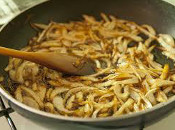 Quercetin compared to Tomoxifen. In cultured human melanoma cells, quercetin was found to bind ER II sites with an affinity similar to tamoxifen and diethylstilbestrol. The concentration required for 50-percent growth inhibition for one cell line was lower for quercetin (7 nM) than for tamoxifen (9 nM), otherwise the growth inhibitory activity of the two compounds was similar. Quercetin induces type-II estrogenbinding sites in estrogen-receptor-negative and estrogen-receptor-positive human breast cancer cell lines. Scambia G, Ranelletti FO, Benedetti Panici P, et al. Int J Cancer 1993; 54:462-466.
Quercetin compared to Tomoxifen. In cultured human melanoma cells, quercetin was found to bind ER II sites with an affinity similar to tamoxifen and diethylstilbestrol. The concentration required for 50-percent growth inhibition for one cell line was lower for quercetin (7 nM) than for tamoxifen (9 nM), otherwise the growth inhibitory activity of the two compounds was similar. Quercetin induces type-II estrogenbinding sites in estrogen-receptor-negative and estrogen-receptor-positive human breast cancer cell lines. Scambia G, Ranelletti FO, Benedetti Panici P, et al. Int J Cancer 1993; 54:462-466.
Quercetin deprives tumor cells of proteins they need to survive. Quercetin has been found to inhibit production of heat shock proteins in several malignancies including breast cancer, leukemia, and colon cancer. Heat shock proteins form a complex with mutant p53, which allows tumor cells to bypass normal mechanisms of cell cycle arrest. Heat shock proteins contribute to cancer cells survival under different bodily stresses (low circulation, fever, etc.), and are associated with shorter disease free survival and chemotherapy drug resistance in breast cancer. Modulation of prostaglandin A1-induced thermotolerance by quercetin in human leukemic cells: role of heat shock protein Elia G, Amici C, Rossi A, Santoro MG.
Quercetin keeps human colon cancer cells from tolerating heat in order to better survive. Quercetin, an inhibitor of heat shock protein synthesis, inhibits the acquisition of thermotolerance in a human colon carcinoma cell line. Cancer Res 1996; 56:210-217.
More about heat shock proteins:
- Heat shock protein hsp70 in patients with axillary lymph node-negative breast cancer: prognostic implications. Ciocca DR, Clark GM, Tandon AK, et al. J Natl Cancer Inst 1993;85:570-574.
- The small heat shock protein hsp27 is correlated with growth and drug resistance in human breast cancer cell lines. Oesterreich S, Weng CN, Qui M, et al. Cancer Res 1993.
Quercetin reduces skin damage during radiation therapy for head and neck cancers. A human study showed topical and oral administration of quercetin to reduce skin damage during radiotherapy in patients with head and neck cancers. The possibilities of protection against local radiation injuries in ORL-oncologic patients. Rozenfeld LG, Abyzov RA, Bozhko GT, et al. Vestn Otorinolaringol 1990;2:56-58. [Article in Russian]

Quercetin Absorption. Humans fed fried onions containing quercetin glucosides equivalent reached a maximum serum concentration 2.9 hours after ingestion. The half-life of this dose was 16.8 hours, and significant serum levels were noted up to 48 hours post ingestion. Absorption and disposition kinetics of the dietary antioxidant quercetin in man. Hollman PCH, Gaag MVD, Mengelers MJB, et al. Free Rad Biol Med 1996; 21:703-707.
Quercetin has not shown adverse effects. Human studies have not shown any adverse effects associated with oral administration of quercetin in a single dose of up to four grams or after one month of 500 mg twice daily. If quercetin is administered by the intravenous route, it is advised to check kidney function on a regular basis. Quercetin in men with category III chronic prostatitis: a preliminary prospective, doubleblind, placebo-controlled trial. Shoskes DA, Zeitlin SI, Shahed A, Rajfer J. Urology 1999; 54:960-963.
Quercetin has long been used as an anti-inflammatory and anti-allergy agent. Quercetin has a history of use by nutritional physicians as an anti-inflammatory and anti-allergy agent. Quercetin (Monograph). Altern Med Rev 1998; 3:140-143.
From Cornell, 2004:
- Quercetin outpreformed vitamin C in rat studies related to Alzheimer’s. Researchers exposed groups of isolated rat brain cells to varying concentrations of either quercetin or vitamin C. The cells were then exposed to hydrogen peroxide to simulate the type of oxidative cell damage that is believed to occur with Alzheimer’s. These results were then compared to brain cells that were similarly exposed to hydrogen peroxide but were not pre-treated with antioxidants.
- Quercetin’s strong protective effect against neurotaxicity. Brain cells that were treated with quercetin had significantly less damage to both cellular proteins and DNA than the cells treated with vitamin C and the cells that were not exposed to antioxidants. This demonstrates quercetin’s stronger protective effect against neurotoxicity, according to the researchers. Published in the Dec. 1, 2004 issue of the Journal of Agricultural and Food Chemistry, a peer-reviewed publication of the American Chemical Society, the world’s largest scientific society.
From University of South Carolina and Clemson University, 2008:
- Quercetin helped fight off respiratory infection. When researchers gave mice the flu virus along with a dose of quercetin, the mice were better able to fight off respiratory infection, especially when their immune systems were put to the test following a bout of stressful exercise.
- Quercetin fed mice were 27% more likely to be healthy despite exposure to flue virus. At the end of the 21 day trial, the quercetin-fed “stressed” mice were 27 percent more likely to be healthy, despite the exposure to the virus.
- Foods containing quercetin naturally boost immune system.This study supports previous findings that suggest including foods containing quercetin, which is a natural anti-histamine and anti-inflammatory compound, may be a natural way to help boost the immune system and help fight off infection. Study published in the American Journal of Physiology-Regulatory, Integrative and Comparative Physiology, 2008.
From the Department of Foods and Nutrition, University of Georgia, and Carbohydrate Research Center:
- Chemo-protective action of quercetin towards colon cancer. The effects of quercetin on SW480 human colon carcinoma cells: a study by Michael F Mouat, Kumar Kolli, Ronald Orlando, James L Hargrove and Arthur Grider. High fruit and vegetable intake is known to reduce the risk of colon cancer. To improve understanding of this phenomenon the action of different phytochemicals on colon cells has been examined. One such compound is quercetin that belongs to the group known as flavonoids. The purpose of this study was to determine the influence of quercetin on the proteome of the SW480 human colon adenocarcinoma cell line, specifically to identify proteins that could be the molecular targets of quercetin in its amelioration of the progression of colon cancer. Quercetin treatment of the SW480 human colon cancer cells was found to result in the decreased expression of three proteins and the increased expression of one protein. The identified proteins with decreased expression were type II cytoskeletal 8 keratin and NADH dehydrogenase Fe-S protein 3. The other protein with decreased expression was not identified. The protein with increased expression belonged to the annexin family. Conclusion: Several proteins were determined to have altered expression following treatment with quercetin. Such changes in the levels of these particular proteins could underlie the chemo-protective action of quercetin towards colon cancer. From University of South Carolina’s Arnold School of Public Health.
- Quercetin provides 13.2% endurance increase. For the study, funded in part by the U.S. Department of Defense, 12 participants were randomly assigned to one of two treatments. Half were given 500 mg of quercetin twice a day in Tang for seven days. The other subjects drank Tang with placebos. After the seven days of treatment, during which the subjects were told not to alter their physical activity, the participants rode stationary bicycles to the point of fatigue.The participants were healthy, relatively active, college-age students, but they were not physically trained athletes, and they were not taking part in a regular exercise training program. The results: After taking quercetin for only seven days, the participants had a 13.2 percent increase in endurance and a 3.9 percent increase in VO2max. “These were statistically significant effects that indicate an important improvement in endurance capacity in a very short time,” said Dr. Mark Davis, the study”s lead author.
- Quercetin mimicked effects of exercise. “Quercetin supplementation was able to mimic some of the effects of exercise training.”
- Quercetin may increase mitochondria in brain and muscle cells. Although the study did not examine why the results were so dramatic, Davis said pre-clinical data suggest that quercetin may increase the mitochondria in brain and muscle cells. He likened the mitochondria to the “powerhouse of the cell,” producing most of its energy. Mitochondria in brain and muscle also are believed to be fundamentally important in battling age-related dementia, obesity, diabetes and cardiovascular dysfunction. “One of the most important biological mechanisms for increasing endurance is increasing the mitochondria,” said Davis. “More mitochondria in the brain and muscle would enhance both mental and physical energy, as well as provide a better ability to fight other diseases in which mitochondrial dysfunction are hallmarks.”
- Quercetin fights inflammation. Quercetin also appears to have valuable properties to fight inflammation, which has been linked to health problems such as colon cancer and heart disease. Davis’ research group has recently received a National Institutes of Health grant to study quercetin’s effects on colon cancer and others are pending that involve breast cancer.The findings of the study are reported in the International Journal of Sports Nutrition and Exercise Metabolism, published online Wednesday, June 24, 2009.
